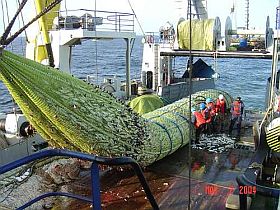EU – Baltic States, Legislation, Lithuania, Markets and Companies
International Internet Magazine. Baltic States news & analytics
Monday, 26.01.2026, 18:25
Future of Lithuania's fishing in Brussels’ hands
 Print version
Print version |
|---|
Lithuania Ocean fishing business has major interests in fish belonging to Mauritania's fishing zone. The ships in that area catch more than 100,000 tons of fish per year. The Lithuania-based company Baltlanta operates fishing on Mauritania's shore, writes LETA.
"Mauritania Republic waters are among the world richest fishing areas and Lithuanian fleet for a long time and successfully were fishing in this country's exclusive economic zone. In recent years, in this area fished six Lithuanian fishing vessels which catch consisted of 50 to 65% of Lithuania's total fish catch," said the Minister of Agriculture Kazys Starkevicius.
Negotiators from European Commission have failed to protect the interests of fishermen in Mauritania zone. This year, the EU-Mauritania Fisheries Partnership Agreement Protocol has been signed which does not meet any of the EU's country's fishing interests, according to Jura24.lt.
Lithuania's Minister of Agriculture Kazys Starkevicius appealed to the Lithuanian representatives in the European Parliament, that they declare their opinion when the issue of the Fisheries Partnership Agreement between the EU and Mauritania will be discussed.
Formerly to the Members of the European Parliament (MEP) Zigmantas Balcytis, Rolandas Paksas, Laima Andrikiene and Justinas Paleckis approached the Lithuanian Fisheries Producers' Association, a member of which is Baltlanta.
The European Commission has undertaken to pay nearly 70 million euros to Mauritania annually. It can be argued that with the likelihood that the fishery will be unprofitable and unattractive; these funds will be only the waste of EU taxpayers' money, as fishers said.
"We believe that the adoption of this Protocol Agreement, fishing in Mauritania Republic Economic Zone waters will become unprofitable. Lithuanian vessels will be forced to retreat from this important for the Lithuanian fishing industry area. If nobody finds the alternatives, the fishing vessels will be sold and sailors will be fired. Lithuania gradually lose its influence as a marine state authority," said the Minister of Agriculture Kazys Starkevicius.
"The European Union more obstructs us than helps," assured the company's Baltic Atlant Shipping", operating Baltlanta fishing boats, spokesman Aleksandras Lobaciovas.
According to EU initiative on the Mauritanian coast closed area will increase from 12 to 20 nautical miles. About 80% of catches Baltlanta ships caught off the coast of Mauritania area from 12 to 15 nautical miles. In open waters outside 20 nautical miles fishermen have not what to do. There, a fishing catch is ten times smaller.
Fishing business derogatory requirement is the fact that 60% of EU fishing vessels' crews has to be Mauritanian local sailors.
They have no marine qualifications, even though offshore Mauritania has issued navy documents.
Another requirement is to sale fish only in Mauritania and gratuitously gives two% of the catch to local government as a support for hungry people. Aleksandras Lobaciovas noticed that there is an abuse. The very best fish is required that seems to be caught not for starving, but for resellers. This means legally legitimized corruption.
There is imposed fuel purchases monopoly in Mauritania through one company. In addition there are enhanced taxes, which are up to six times produces costs in Mauritanian fishing zone. For such unrealistic technical fishing conditions fishing in Mauritania are impossible.
Lithuanian fishermen in Mauritania zone is only a small part of the total fishing fleet. In Mauritania's fishing zone fish crafts from Russia, Ireland, Latvia, China, Belgium, Iceland, Ukraine, South Korea. In this zone mostly manage Dutch fishermen. There are two pure Dutch companies and several other joint companies with Germans, Irish, Poles, even with Lithuanians.
Baltlanta is one of the oldest companies operating in this area. According Aleksandras Lobačiovas Baltlanta fishing areas are in Mauritania, Senegal, and Morocco since 1990. With Morocco and Senegal EU relations have already deteriorated. Fishermen have complains that the EU has not signed on new fisheries agreements with Senegal, Namibia and Angola on fishing in their areas.
Two decades ago in Mauritania's fishing zone fish about 20 vessels which caught about 50-70 tons of fish a day. Now about 70 large vessels fishing and they freeze about 400 tons of fish a day. A separate part of the Mauritanian fishing zone makes the Spanish fishing fleet; it is the biggest fishing unpelagic species – octopus, shellfish, and hakes.
Lithuanian fishermen have experienced problems linked with the EU's institutional incompetence in Mauritania region. From time to time due to improper allocation of fishing licenses resulted in fishing vessel downtime.
Already before the Mauritanian area fishermen were amazed that there is a legal monopoly on the supply of fuel, which is contrary to the provisions of the World Trade Organization.








 «The Baltic Course» Is Sold and Stays in Business!
«The Baltic Course» Is Sold and Stays in Business!

